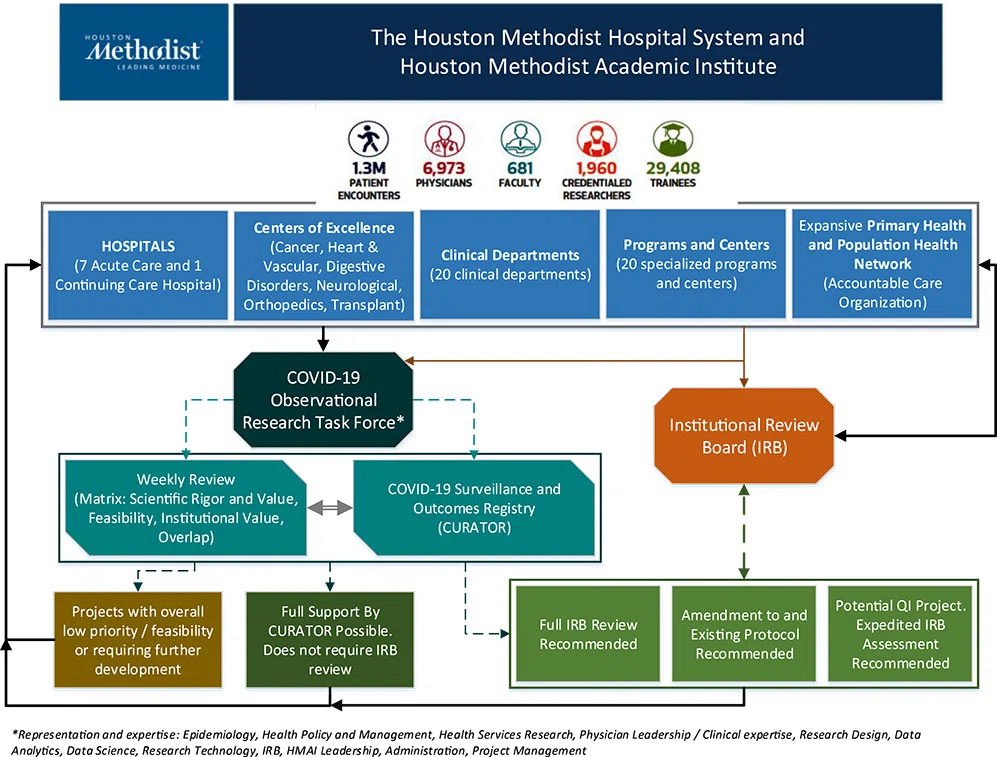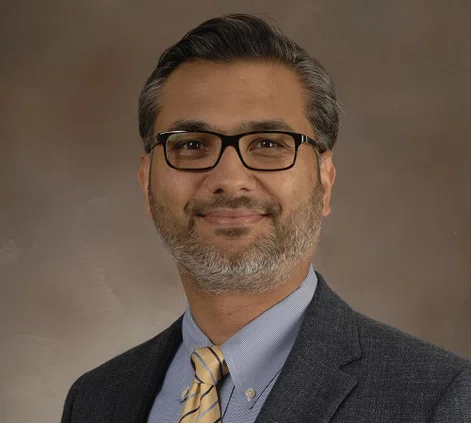


Outcomes Research
A Learning Healthcare System Takes on COVID-19

CURATOR offers an informatics driven approach to evidence synthesis
Development of the CURATOR digital repository integrated data and clinical practice for insights into Houston's two COVID-19 surges in spring and summer of 2020.
The emergent nature of the SARS-CoV-2 pandemic challenged Houston Methodist to obtain real time data about patients’ socio-demographics, diagnoses, treatments, suitability for enrollment in clinical trials, and outcomes. The Center for Outcomes Research met this challenge, paving the way for evidence-based comparisons between Houston’s first COVID-19 surge, March 13-May 15, and the resurgence, May 15-July 7, 2020.
In a Research Letter published in JAMA on Aug. 13, researchers at the Center for Outcomes Research shared some of the earliest data for the second surge—showing a demographic shift toward a younger, predominantly Hispanic, and lower socioeconomic patient population with an overall lower comorbidity burden, ICU admission rate, and in-hospital mortality.
The insightful data was available with such a quick turnaround due to a concerted effort during the first surge to establish a bioinformatics repository: COVID-19 Surveillance and Outcomes Registry, or CURATOR. The registry was organized under the Retrospective Research Task Force (RRTF). When the pandemic arrived, Dirk Sostman, MD, Houston Methodist chief academic officer, established the RRTF, giving it full institutional support and autonomy to operationalize a bioinformatics pipeline to help prioritize and facilitate COVID-19 research. The RRTF collaborated with the Institutional Review Board (IRB), which approved the CURATOR research database to address operational needs, outcomes research and institutional reporting.
Designed to support multiple observational COVID-19 projects and share validated phenotypic data, CURATOR was created by a cross-departmental team led by Farhaan S. Vahidy, PhD, MBBS, MPH, associate director, Center for Outcomes Research. Having just arrived from UTHealth in January 2020, Vahidy had begun assessing the systems across Houston Methodist’s academic medical center and seven satellite hospitals, to establish the infrastructure for a learning healthcare system (LHS).
In the face of the COVID-19 pandemic, we found a great opportunity to propel Houston Methodist towards a learning healthcare system. This system enables rapid access to validated data that are iteratively incorporated into clinical and business operational decision-making and are simultaneously and continually evaluated for validity.

Farhaan S. Vahidy, PhD, MBBS, MPH, FAHA
Coneway Family Centennial Endowed Directorship in Quality & Outcomes
Associate Director, Center for Outcomes Research
Houston Methodist
In response to receiving more than 40 COVID-19-focused proposals during the first surge, the CURATOR team established a process for delineating and warehousing data so that common elements could be shared and used as a resource across Houston Methodist. This helped expedite projects that could be completely quickly with the insertion of the newest COVID-19 data .
With the recent data revealed for Houston’s second surge of COVID-19, Houston Methodist has taken immediate action. Community outreach has increased Spanish-language education and enhanced translation services about COVID-19. The critical care team also has adapted treatment plans to care for the younger patient population with lower co-morbidity. And the outcomes show the team has been successful at sustaining lower mortality rates: National comparisons place Houston Methodist critical care team’s success rates among the highest in the nation .
“Our clinical team is closely tracking outcomes and applying in real time what we learn,” said Faisal N. Masud, MD, Mary A. and M. Samuel Daffin, Sr. Centennial Chair in Anesthesia and Critical Care, medical director of critical care, Houston Methodist Hospital, and professor of clinical anesthesiology, Departments of Anesthesiology & Critical Care and Cardiovascular Sciences, DeBakey Heart & Vascular Center. “As treatments continually evolve, we are treating the younger COVID-19 patient population as early as possible, thus avoiding the ICU and reducing mortality.”
This adaptive process provides a robust mechanism for Houston Methodist to address the changing dynamics of health care delivery.

This figure illustrates how CURATOR facilitates the review process. The blue portion (top) shows the size and breadth of the system. The arrows indicate the streamlined workflow from CURATOR to the IRB. (Click graphic to see full size.)
The LHS concept aspires to merge evidence-based medicine and practice-based evidence. It relies on collaboration between clinicians and researchers to provide and use big data through a continual process that achieves ever-improving patient care in a real-time healthcare setting.
The timing was perfect to set up a learning healthcare process. Widespread use of electronic heath records, availability of big data and diverse healthcare data sources, and advances in technological tools facilitate data extraction, transformation, merging and loading: These are the building blocks that inform administrative and clinical decision-making on a larger scale.
The other crucial aspect of an LHS model is organizational behavior and readiness. Vahidy offers further insight into this aspect of LHS in a JAMA commentary published Sept. 8, 2020. A key LHS consideration when developing CURATOR was: Is the system agile enough, in an organizational context, to take action based on data from a top-down approach?
“Houston Methodist’s structure and teams proved to be highly agile and adaptable, which made it possible to create the system in literally weeks,” Vahidy said. “The ability to make and implement decisions was phenomenal, capable of responding quickly in the midst of a global pandemic, with the majority of the team working remotely.”

Vahidy FS, Drews AL, Masud FN, Schwartz RL, Askary BB, Boom ML, Phillips RA. Characteristics and Outcomes of COVID-19 Patients During Initial Peak and Resurgence in the Houston Metropolitan Area. JAMA. Published online August 13, 2020. DOI:10.1001/jama.2020.1530
Vahidy, FS. A Learning Health Care System–Based Approach for Improving Quality of Care Among Patients With Transient Ischemic Attack. JAMA Network Open. 2020;3(9):e2016123. DOI:10.1001/jamanetworkopen.2020.16123
By LaVonne Carlson, September 2020








